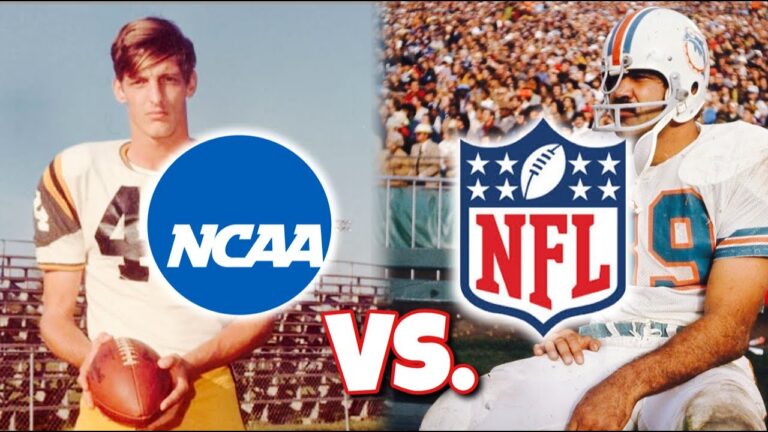College football versus the NFL – a longstanding debate that ignites the passion of football fans across the nation. Every fall, as both leagues gear up for their respective seasons, the age-old question resurfaces: is college football better than the NFL? Whether you’re a die-hard fan of the intense rivalries and traditions of the college game or you prefer the professional polish and skill of the NFL, there’s no denying the allure of both. In this ultimate gridiron showdown, we’ll delve into the contrasting aspects of college football and the NFL, examining what sets these two football powerhouses apart and what might ultimately make one stand out as the superior football spectacle.
Introduction: Comparing College Football and NFL
When discussing the perennial debate of is college football better than NFL, it’s essential to delve into the unique characteristics that define each level of play. From the passion and pageantry of college football to the precision and professionalism of the NFL, both offer distinct yet captivating experiences for fans and players alike.
Passion and Pageantry in College Football
College football embodies the spirit of amateur athletics, with teams representing their institutions and fan bases rallying behind their alma maters. These fierce rivalries span decades and create an unparalleled atmosphere that resonates throughout the college towns and stadiums. Players compete not for salaries but for pride and glory.
Precision and Professionalism in the NFL
Conversely, the NFL showcases the pinnacle of football excellence, where the best players in the world compete at the highest level. Teams operate as franchises with a focus on sustained success and championship aspirations. The precision and discipline exhibited in NFL games highlight the peak performance achievable in the sport.

The History and Tradition of College Football
College football has a rich history dating back to the 19th century, with the first game played between Rutgers and Princeton in 1869. The sport quickly gained popularity among universities, establishing traditions and rivalries that endure to this day.
The Birth of College Football
College football’s origins can be traced back to the late 1800s when universities began organizing games among themselves. Walter Camp played a crucial role in shaping the early rules of the game, laying the foundation for what would become modern college football.
Legacy and Tradition
College football is steeped in tradition, from iconic rivalries like Ohio State vs. Michigan to annual bowl games that captivate fans nationwide. These traditions create a sense of pride and nostalgia for alumni and fans alike.
- Homecoming celebrations
- Marching band performances
- Game day tailgates
The Structure and Format of the NFL
The NFL, or National Football League, consists of 32 teams divided into two conferences: the American Football Conference (AFC) and the National Football Conference (NFC).
Regular Season
Each team plays 16 games over 17 weeks, with one bye week. The top 6 teams from each conference then proceed to the playoffs.
Teams are seeded based on their performance in the regular season, with division winners guaranteed a spot and others competing for wild card entries.
Playoffs and Super Bowl
The playoffs consist of multiple rounds, culminating in the AFC and NFC champions facing off in the Super Bowl, the league’s championship game.
The Super Bowl is one of the most-watched sporting events globally, drawing millions of viewers each year.

Level of Competition: College Football vs. NFL
When comparing the level of competition between college football and the NFL in terms of intensity and skill, both offer unique challenges and excitements.
Player Talent and Skill
In college football, players are typically younger and still developing their skills, whereas in the NFL, players are considered the best of the best, with refined talents honed through years of experience.
However, college football often showcases raw talent and enthusiasm not commonly seen at the professional level.
Intensity and Speed of the Game
The NFL is known for its lightning-fast pace and physicality, with players competing at the highest level week in, week out.
On the other hand, college football games can sometimes be more unpredictable and emotionally charged, making for thrilling matchups.
In 2021, the competition level in both college football and the NFL has been at its peak, with teams striving to outperform each other.
- 2021 NFL teams are stacked with talent from top to bottom.
- College football’s underdog stories create a captivating narrative for fans.
Player Development and Transition: College to NFL
When it comes to player development and transitioning from college to the NFL, the process can be a significant challenge for many athletes. The jump from collegiate competition to the professional level requires not only exceptional physical skills but also mental adaptability.
Training and Preparation
College football provides a solid foundation for players, but the NFL demands a higher level of physicality and strategy. Prospects often undergo intense training programs to enhance their strength, speed, and agility before entering the draft.
Adjusting to the complexity of NFL playbooks and the faster pace of the game is crucial. Adaptability and quick learning are key traits that successful players exhibit during this transition.
Mentorship and Coaching
Having experienced mentors and coaches is vital for rookies making the leap. Veterans in the NFL can offer valuable insights and guidance, helping young players navigate the challenges of the professional league. Mentorship programs have become popular in many NFL teams to support rookies.
- Guidance from seasoned players
- Advice on managing the pressures of NFL
- Technical coaching for position-specific skills
Gameplay and Rules Differences
When comparing college football to the NFL, there are several significant gameplay and rule differences that make each unique. One key difference is the hash marks on the field which are wider in college football than in the NFL, impacting the placement of the ball. This leads to more varied plays and strategies in college games.
Player Eligibility
In college football, players are only eligible to play if they maintain amateur status, whereas NFL players are professionals. This impacts the style of play and the passion exhibited on the field. College players often showcase a raw energy and love for the game that resonates with fans.
Number of Games
College football teams play fewer games in a season compared to NFL teams. While NFL teams have a 16-game regular season schedule, college football teams typically play 12 regular-season games. This creates higher stakes for each college game, making every matchup critical for a team’s ranking and postseason aspirations.
Timeout Rules
In college football, each team is allowed three timeouts per half, while in the NFL, teams only get three timeouts per game. This impacts the pace and strategy of the game, as college teams have more opportunities to stop the clock and make adjustments during crucial moments of the game.
![Football field illustration showing gameplay differences in college vs NFL - [YEAR]](https://www.si.com/.image/ar_16:9%2Cc_fill%2Ccs_srgb%2Cfl_progressive%2Cq_auto:good%2Cw_1200/MTY4MDI3Njk4NDc2NDkyMDQ5/college-football-championshipjpg.jpg)
Fan Engagement and Passion
When it comes to fan engagement and passion, the debate between college football and the NFL reaches a fever pitch. College football is renowned for its rich tradition, enthusiastic student sections, and loyal alumni support. The stadiums echo with chants, cheers, and the colors of the respective teams, creating an electrifying atmosphere.
Community Support and Involvement
College football programs are deeply ingrained in their local communities, with fans forming a strong emotional connection to their alma mater or local university. This bond fosters a sense of belonging and pride, driving fans to actively support and participate in the team’s journey.
College football games often serve as community events where families, friends, and alumni come together to celebrate their shared passion for the sport. The sense of camaraderie and unity among fans contributes to the vibrant tapestry of college football traditions.
Fanatical Fan Bases
College football fans are known for their unwavering loyalty and fervent support, often spanning generations within a family. The deep-rooted traditions, rivalries, and history associated with college football programs further fuel the passion of these fanatical fan bases.
From elaborate tailgating rituals to painted faces and costumes, college football fans go above and beyond to showcase their dedication and allegiance to their teams. This level of passion and engagement creates a unique and unforgettable experience for both players and spectators alike.
Financial Aspects: College Football vs. NFL
When it comes to the financial aspects of college football versus the NFL, there are significant differences to consider. While the NFL is a multi-billion dollar industry, college football operates within the realm of amateur athletics.
Revenue Generation
College football programs primarily rely on revenue from ticket sales, merchandise, and boosters, whereas NFL teams benefit from lucrative TV deals, sponsorship agreements, and merchandise sales.
In the current year, the NFL generated over $15 billion in revenue, showcasing its financial dominance over college football.
Player Salaries
One of the key distinctions is player compensation. While NFL players receive substantial salaries, college athletes are considered amateurs and are not financially compensated for their participation.
Despite this, collegiate athletes can receive scholarships, stipends, and other benefits, but they do not earn salaries like their NFL counterparts.
Impact on Communities and Culture
College football vs. NFL not only stirs fervent debates but also holds significant impacts on communities and cultures. College football is deeply ingrained in the fabric of American culture, fostering loyalty and camaraderie among alumni, students, and fans.
Community Spirit
College football games serve as rallying points for communities, bringing people together to support their alma maters. The tailgating traditions create a festive atmosphere that enhances the bond among fans.
The NFL, although immensely popular, lacks the same localized intimacy and sense of belonging that college football provides to communities.
Cultural Significance
College football’s regional rivalries and longstanding traditions contribute to the diverse cultural tapestry of the United States. The pageantry of college game days, from marching bands to mascots, reflects the unique identities of each institution.
- These cultural nuances are cherished and celebrated by fans, creating a sense of pride in their heritage and heritage.
Frequently Asked Questions
-
- Is college football more exciting than the NFL?
- Many fans believe that college football is more exciting than the NFL due to the passion and energy of college games, as well as the unpredictability of the matchups.
-
- Are the players in college football as skilled as those in the NFL?
- While college players are undoubtedly talented, NFL players are considered to be at a higher skill level due to their experience, training, and competition in the professional league.
-
- Do college football games have a different atmosphere compared to NFL games?
- Yes, college football games often have a more festive and spirited atmosphere with passionate fans, marching bands, student sections, and unique traditions that create a vibrant gameday experience.
-
- Which league has more parity between teams, college football, or the NFL?
- College football tends to have more variance in team performances due to factors like recruiting, coaching changes, and player turnover, leading to greater parity between teams compared to the NFL.
-
- Is the level of competition higher in college football or the NFL?
- The level of competition is generally considered to be higher in the NFL due to the elite skills and athleticism of professional players, as well as the strategic complexity of the game at the highest level.
In Conclusion: Is College Football Better Than NFL?
After delving into the ultimate gridiron showdown between college football and the NFL, it’s clear that both have their own unique appeal. College football showcases raw passion and unbridled enthusiasm, rooted in the spirit of collegiate loyalty and tradition. On the other hand, the NFL offers a level of skill, precision, and high-stakes drama that captivates millions of fans worldwide.
While the debate rages on over which is better, it ultimately boils down to personal preference. Whether you prefer the pageantry of Saturdays or the intensity of Sundays, one thing is certain – both college football and the NFL provide unforgettable moments that define the essence of American football.
So, whether you’re donning your alma mater’s colors or cheering for your favorite NFL team, the beauty of football lies in its ability to unite fans from all walks of life in a shared love for the game.





